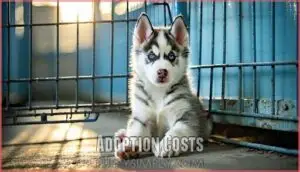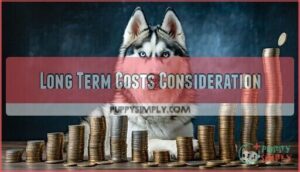This site is supported by our readers. We may earn a commission, at no cost to you, if you purchase through links.

Adoption fees run much lower at $50 to $300 from shelters.
Don’t forget monthly expenses add up quickly – expect $100 to $200 for food, healthcare, and grooming.
Your location, the dog’s age, coat color, and breeder reputation all influence the final price tag.
Blue eyes and rare coat patterns often bump up costs, making it an investment in a loyal companion who’ll stick by your side for 12 to 15 years, and with smart budgeting strategies, you can help save thousands over your husky’s lifetime.
Table Of Contents
- Key Takeaways
- Husky Purchase Costs
- Monthly Ownership Costs
- Factors Affecting Husky Price
- Husky Care Expenses
- Long Term Costs Consideration
- Husky Price Variations
- Budgeting for Husky Ownership
- Husky Ownership Value
- Frequently Asked Questions (FAQs)
- How much does a husky puppy cost?
- How much does a husky cost in the UK?
- How much do Siberian Huskies cost?
- How much does it cost to rescue a Husky?
- Are Huskies cheap?
- Are husky dogs expensive?
- What is the cost of Huskies?
- Is Husky a good dog to own?
- Can a husky live to 20?
- What is the average life expectancy of a Siberian husky?
- Conclusion
Key Takeaways
- You’ll pay $400-$1,500 for a husky from reputable breeders, though champion bloodlines can reach $2,500-$5,000, while shelter adoption costs just $50-$300 and includes spaying, vaccinations, and microchipping.
- Budget $100-$200 monthly for ongoing expenses including premium food ($40-60), healthcare ($50-200), grooming, and training – these recurring costs add up quickly over your dog’s lifetime.
- Plan for $15,000-$30,000 in total lifetime costs over 12-15 years, including potential emergency expenses like hip dysplasia treatment ($6,000) and end-of-life care that make building an emergency fund essential.
- Your location, the dog’s bloodline, and breeder reputation significantly impact pricing – rare coat colors, blue eyes, AKC registration, and champion genetics can add hundreds to thousands to the purchase price.
Husky Purchase Costs
You’ll find Husky purchase costs vary dramatically, ranging from $50 at rescue shelters to over $2,500 for champion bloodline puppies from reputable breeders.
Your upfront investment depends on whether you choose adoption, purchase from a pet store, or work with a specialized breeder, with each option offering different price points and included services.
Initial Purchase Price
Expecting to bring home a Siberian husky? You’ll face initial costs ranging from $150 for shelter adoption to $6,000 for champion bloodlines.
Most reputable breeders charge $600-$1,500 for healthy puppies, while rescue organizations offer significant adoption savings at $150-$400.
Location impact and bloodline significance heavily influence husky price, making research essential before purchasing.
Breeder Fees
Reputable breeders charge premium prices because they invest heavily in their dogs’ health and lineage.
You’ll pay more, but you’re getting quality assurance that backyard breeders can’t match.
Here’s what drives breeder fees:
- Health testing costs – Hip, elbow, and eye screenings for parent dogs
- Champion bloodlines – AKC registered pedigree with show potential lineage
- Health guarantees – Written contracts protecting against genetic conditions
- Ethical breeding practices – Proper socialization and veterinary care
- Registration paperwork – Full AKC documentation with breeding rights
Adoption Costs
Husky adoption through animal rescue centers offers significant savings compared to breeders.
Adoption fees typically range from $275 to $400, with adult adoption costing around $250. These costs include spaying, vaccinations, and microchipping – shelter benefits that save you hundreds.
Rescue differences vary by location, but most adoption costs cover essential medical care you’d pay separately elsewhere.
Prospective owners should also consider husky’s life expectancy when choosing a dog, considering the overall life expectancy and associated costs to make an informed decision about husky adoption.
Rescue Shelter Fees
Compassion drives many to rescue shelters, where husky adoption costs typically range from $50-$500.
These adoption costs include spaying/neutering, vaccinations, and microchipping—excellent adoption benefits compared to breeder prices.
However, shelter variations exist in fee coverage and application process requirements.
Research potential hidden costs like behavioral training needs, as some rescued huskies require additional support from their previous experiences, which may involve behavioral training.
Monthly Ownership Costs
Once you’ve brought your husky home, you’ll need to budget for ongoing monthly expenses that typically range from $100 to $600 depending on your choices.
These recurring costs include food, healthcare, grooming, and training expenses that’ll keep your energetic companion healthy and happy throughout their life, which can be considered as ongoing monthly expenses.
Food Expenses
Quality dog food represents your biggest monthly expense, typically costing $40-60 for premium kibble.
Your husky’s dietary needs require high-quality diet rich in protein and fats.
Establish a consistent feeding schedule while factoring in nutritious treats at $5-15 monthly.
For ideal canine health, consider the best kibble options.
Bulk buying reduces costs substantially—a 30-pound bag lasts 6-7 weeks, making dog nutrition more affordable with a consistent feeding plan.
Healthcare Costs
Your husky’s healthcare costs will range from $50 to $200 monthly, depending on preventive care and emergency treatments.
Pet insurance helps manage unexpected veterinary costs, especially for genetic issues common in the breed. You can find products related to husky vaccines cost online.
Monthly healthcare essentials include:
- Annual vaccines – $120 yearly
- Heartworm prevention – $204 annually
- Flea/tick protection – $240 yearly
- Regular checkups – $50-$250 each
- Wellness plans – $30-$50 monthly
Grooming Expenses
Dealing with double-coated breeds means you’ll face seasonal shedding battles twice yearly.
Professional grooming costs $50-100 during peak shedding seasons, while DIY grooming saves money with proper tools.
To maintain a healthy coat, consider investing in specialized husky brushes.
Your grooming frequency increases dramatically when coat care becomes essential for managing dog shedding effectively.
| Grooming Method | Cost Range | Frequency |
|---|---|---|
| Professional Sessions | $50-100 | 2-4 times yearly |
| DIY Home Grooming | $0-20 monthly | Weekly brushing |
| Grooming Tools Investment | $30-80 | One-time purchase |
| Seasonal Deep Clean | $75-150 | Twice yearly |
Training Costs
Training methods for huskies range from budget-friendly to premium options.
Puppy classes typically cost $100-200 for group sessions, while private trainers charge $50-150 per hour.
You’ll save money with DIY training using online resources and books.
Obedience classes help address behavioral issues early, preventing costly problems later.
Investing in proper canine behavior training pays off long-term.
Factors Affecting Husky Price
When you’re shopping for a Husky, you’ll quickly discover that prices can range anywhere from $200 to over $5,000 depending on several key factors that determine value.
Understanding what drives these price differences will help you make an informed decision and budget appropriately for your new four-legged family member, considering the various elements that impact the overall value.
Lineage and Pedigree
A pedigree acts like a family tree, directly impacting your husky price.
Champion bloodlines command premium rates—expect $2,500+ for grand champion lineage versus $1,000-2,000 for standard purebreds.
AKC registration and genetic testing add value, while breeding rights cost extra.
Each missing trait in the parents drops prices by $100-200, making lineage history your biggest pricing factor.
Coat Color and Eye Color
Coat colors and eye colors substantially impact your husky’s price tag.
Rare coat colors like pure white or agouti command premium prices, while standard gray-and-white combinations cost less.
Heterochromia—those striking different-colored eyes—can add hundreds to the purchase price.
Show dog standards favor specific coat patterns, and eye color genetics determine rarity.
Color popularity fluctuates, affecting market demand and pricing, with heterochromia being a notable factor.
Age and Gender
Age impacts your husky price substantially, with puppies commanding premium costs compared to adult dogs.
Male vs female pricing varies too, as males typically cost more upfront but females bring higher spaying expenses later.
Your puppy cost reflects intensive early care needs, while adult dog adoption offers budget-friendly alternatives.
- Puppy vs Adult pricing shows $800+ difference, with puppies requiring extensive vaccination schedules
- Male Health Costs average lower initially, but females face $200-700 spaying expenses
- Gender Temperament affects training investment – males need more behavioral guidance
- Age Training Needs vary dramatically, puppies demanding 6+ months of intensive socialization classes
Husky Care Expenses
Once you bring your husky home, you’ll need to budget for ongoing care expenses that extend far beyond the initial purchase price.
These monthly and annual costs, which range from $100 to $600 per month, include essential veterinary care, high-quality nutrition, regular grooming, and proper training to keep your energetic companion healthy and well-behaved.
Veterinary Care
Veterinary fees form the backbone of responsible husky ownership, with routine checkups averaging $100-300 annually.
Vaccination costs run $75-100 per set during puppyhood.
Common ailments like hip dysplasia can reach $6,000 in emergency treatment.
Preventative care saves money long-term, while pet insurance options help manage unexpected health issues.
Emergency veterinary care becomes essential given huskies’ active nature.
Diet and Nutrition
Feeding your husky properly affects your wallet and their wellbeing.
Premium dog food costs $40-60 monthly, but you’ll save on vet bills later.
An ideal diet with breed-specific nutrition keeps these active dogs healthy and energetic.
- High-quality kibble designed for active, medium-to-large breeds
- Raw feeding options including lean meats, organs, and bones
- Supplement needs like fish oil for coat health and joint support
- Hydration importance with fresh water available throughout the day
- Canine nutrition timing with two meals daily for proper digestion
The key to a healthy husky is providing the right nutrition and ensuring they always have access to fresh water, which is crucial for their hydration.
Grooming Needs
Professional grooming isn’t always necessary since you can handle most husky grooming needs at home.
Shedding frequency peaks twice yearly, requiring daily brushing techniques during these periods, and regular dog coat care includes weekly brushing otherwise.
Bathing huskies only when dirty helps preserve their natural oils.
Nail trimming monthly and professional groomers for deep cleans cost $50-100 seasonally, which can be a significant part of overall grooming expenses.
Exercise and Training
Huskies demand high-intensity exercise and consistent training methods to manage their energy.
You’ll need daily runs, dog sports, or vigorous activities to meet their exercise needs.
Mental stimulation through puzzle toys prevents destructive behavior.
Puppy classes cost $100-600 annually, teaching leash manners and socialization importance.
Without proper dog exercise and training, you’ll face expensive behavioral problems later.
Early socialization is key, as it helps prevent behavioral issues and guarantees they develop into well-rounded pets, which is crucial for their development into well-rounded and behaved pets with a good temperament.
Long Term Costs Consideration
When you’re considering a husky, you’ll face lifetime costs ranging from $15,000 to $30,000, which makes understanding long-term expenses essential for responsible ownership.
Planning for health conditions like hip dysplasia that can cost up to $6,000, building an emergency fund, and evaluating insurance options will help you prepare for the financial commitment ahead.
Lifetime Costs Estimate
Over a husky’s 12-14 year lifespan, you’ll invest $15,000-$30,000 total in pet ownership costs.
Your husky investment pays dividends in loyalty, adventure, and unconditional love that money can’t measure.
This husky price includes healthcare, food, grooming, and unexpected expenses like emergency vet visits.
Smart financial planning and cost-saving strategies help manage these expenses.
While end-of-life care adds emotional weight, most owners find this investment worth it for years of loyal companionship, considering the overall pet ownership costs.
Health Conditions and Risks
Genetic predispositions can hit your wallet hard.
Hip dysplasia treatments cost up to $6,000, while corneal dystrophy requires ongoing eye care.
Progressive atrophy, autoimmune thyroiditis, and bloat risk create expensive health battles.
Cancer susceptibility increases with age, demanding regular screenings. These autoimmune diseases and genetic health conditions make budgeting for health issues in huskies absolutely essential.
Emergency Fund Planning
Smart husky owners build a financial safety net before unexpected vet bills hit.
Set aside three to six months of pet expenses for injury preparedness and disaster planning.
Job loss or financial setbacks shouldn’t force impossible choices about your dog’s care.
Start with $50 monthly contributions to your emergency fund.
Consider that grooming sessions vary in cost depending on your chosen services.
This financial buffer protects both your husky price investment and your peace of mind during tough times.
Insurance and Wellness Plans
Smart pet insurance and wellness plans provide financial protection when veterinary bills pile up.
Most policies cost $35-50 monthly, covering accidents, illnesses, and preventative care through extensive coverage options.
- Policy Coverage – Compare accident-only versus thorough plans
- Preventative Care – Wellness plans cover routine vaccinations and checkups
- Cost Comparison – Monthly premiums range from $15-76 depending on coverage
- Claim Process – Most insurers offer straightforward online reimbursement systems
- Plan Benefits – Annual limits typically range from $735-unlimited coverage
Husky Price Variations
You’ll find that husky prices can swing dramatically from $200 to over $5,000 depending on several key factors that smart buyers need to understand.
Your location, the dog’s bloodline quality, breeder reputation, and registration status all play major roles in determining whether you’ll pay closer to the low end or find yourself writing a much larger check.
Location and Availability
Where you live dramatically impacts husky price variations across different markets.
Regional pricing differs substantially between urban and rural areas, with cities often showing higher costs but better shelter availability.
Breeder locations concentrate in specific regions, affecting local demand factors and transport expenses.
Import costs add substantial fees when crossing borders, making husky price USA, UK, and Canada searches location-specific endeavors.
Bloodline and Purity
Behind every husky’s price tag lies a complex genetic story that directly impacts your wallet.
Champion lineage and pedigree papers from AKC-registered bloodlines command premium prices, while genetic testing and breed standards verification add significant value to purebred huskies.
Key bloodline factors affecting price:
- Champion lineage increases costs by $1,000-$3,000
- AKC pedigree certification adds $500-$1,500 premium
- Genetic testing results influence pricing decisions
- Breed standards compliance affects market value
- Purity certification documentation justifies higher costs
Breeder Reputation
When choosing husky breeders, you’ll find that breeder reputation directly impacts pricing.
Reputable breeders who practice ethical breeding charge $600-$2,000 because they provide health guarantees and puppy socialization.
Their responsible practices, breeder transparency, and commitment to quality justify higher costs.
Finding the right breeder means investing more upfront but potentially saving thousands on future health issues.
Adoption from a shelter can substantially reduce initial purchase costs through a more cost-effective approach.
Registration Status
AKC registration substantially impacts your husky’s price, with fully registered purebred puppies commanding premium rates.
Limited registration costs less but restricts breeding rights, while full AKC registration with pedigree papers adds $200-500 to the purchase price.
Registration benefits include breed verification and show eligibility, though many pet owners find limited registration perfectly adequate for companionship.
Budgeting for Husky Ownership
You’ll need to plan carefully for both the upfront costs and ongoing monthly expenses that come with Husky ownership, which can range from $15,000 to $30,000 over your dog’s lifetime.
Smart budgeting involves setting aside funds for initial setup costs like crates and supplies, while also preparing for monthly expenses that average $135 for food, healthcare, and other essentials, including grooming.
Initial Setup Costs
Getting your husky home means covering essential supplies beyond the husky price.
You’ll need a sturdy crate ($50-$200), microchip fees ($25-$50), and spay/neuter procedures ($200-$700).
Initial vaccinations run $75-$100 per set, with puppies needing 3-4 rounds.
Budget $300-$650 total for these one-time setup costs when bringing home siberian husky puppies for sale.
Monthly Budgeting
You’ll typically budget $135 monthly for your husky’s core needs.
Food costs anchor your monthly expenses at $40-60, while pet insurance averages $35.
Healthcare planning should include $50-200 for routine and emergency care.
Grooming savings come from DIY brushing between professional sessions, and training options range from $25 group classes to $100 private lessons, plus a modest toy budget.
Cost Saving Tips
Smart savings start with bulk buying premium dog food and DIY grooming at home.
You’ll slash costs through insurance bundling and group training classes instead of private sessions.
Toy rotation keeps your husky entertained without constant purchases.
These budget-friendly care strategies deliver significant pet insurance discounts while maintaining quality, which leads to substantial savings over time through small changes.
Prioritizing Expenses
When juggling husky costs, focus your budget on essential needs first.
Veterinary care and quality food can’t be compromised—these directly impact your dog’s health and longevity.
Next, consider insurance options to protect against unexpected expenses.
You can save money through DIY grooming, affordable training classes, and bulk buying food.
Remember, cutting corners on health means higher husky costs later, which is why veterinary care and quality food are crucial.
Husky Ownership Value
While you’ll spend $15,000 to $30,000 over your husky’s lifetime, you’re investing in a loyal companion that transforms your daily routine with their boundless energy and playful nature.
You’ll gain a devoted family member who thrives on outdoor adventures and provides years of companionship, making every dollar worth the commitment when you match their high-energy lifestyle.
Benefits of Owning a Husky
Huskies consistently reward owners with unwavering loyalty and infectious playful nature that brightens every day.
This unique breed becomes your perfect exercise buddy while serving as an exceptional family pet.
Their striking appearance and gentle temperament make the husky price a worthwhile investment.
Whether from adoption or rescue shelter, you’ll gain a loving pet whose companionship enriches your life immeasurably.
Lifestyle and Activity Level
Your lifestyle needs to match your husky’s high-energy demands before you buy.
These dogs aren’t couch potatoes – they need serious exercise and time commitment daily. Huskies also need consistent leadership, given their independent thinking tendencies.
Consider these exercise needs carefully:
- Daily Requirements: 2+ hours of vigorous activity including running, hiking, or sledding
- Space Requirements: Large yard or access to open areas for proper exercise
- Climate Suitability: Thrives in cooler temperatures, struggles in hot weather
Personality and Temperament
Beyond their striking looks, you’re getting a dog with remarkable intelligence and an independent nature that can surprise new owners.
Their high energy and pack mentality means they thrive with consistent leadership, though their vocal breed tendencies and destructive behaviors emerge without proper mental stimulation.
Understanding this dog temperament helps you appreciate their strong-willed, loyal personality that rewards patient training.
Long Term Commitment
Owning a husky means signing up for 12-15 years of daily adventures.
You’ll spend hours meeting their exercise needs and mental stimulation requirements.
Shedding seasons happen twice yearly, demanding extra grooming time.
Factor these time commitments into your husky price calculations—dog ownership costs extend far beyond pet expenses.
Your lifestyle must accommodate their socialization needs and energy levels consistently.
Frequently Asked Questions (FAQs)
How much does a husky puppy cost?
Surprisingly, 80% of husky buyers underestimate total costs. You’ll spend $600-$2,500 for a puppy from reputable breeders, plus $650 for initial supplies and vaccinations. Shelter adoptions cost just $150-$500 including basic care.
How much does a husky cost in the UK?
You’ll pay £500-£1,200 for a husky puppy from UK breeders, while rescue adoption costs £150-£ Show-quality dogs reach £2,000+. Location, bloodline, and breeder reputation substantially affect pricing across Britain.
How much do Siberian Huskies cost?
Getting a Siberian Husky isn’t exactly pocket change – you’ll shell out $600-$2,500 from breeders, or $150-$500 from shelters.
Monthly costs run $100-$600, so budget wisely for your furry escape artist!
How much does it cost to rescue a Husky?
Rescuing a Husky typically costs $50 to $500, with most shelters charging $150- You’ll cover adoption fees that include spaying/neutering, vaccinations, and microchipping – making rescue an affordable option.
Are Huskies cheap?
Huskies aren’t cheap dogs. You’ll spend $600-$2,500 upfront, then $100-$600 monthly for food, healthcare, and grooming. Their lifetime costs range from $15,000-$30,000, making them expensive companions.
Are husky dogs expensive?
Yes, you’ll find husky dogs are expensive.
Initial costs range $600-$2,500, monthly expenses hit $100-$600, and lifetime ownership reaches $15,000-$30,
Their exercise needs and potential health issues add significant long-term expenses.
What is the cost of Huskies?
Lifetime ownership can reach $30,000 per dog. You’ll pay $600-$1,500 upfront from breeders, then budget $100-$600 monthly for food, healthcare, and grooming. Adoption offers cheaper entry at $150-$
Is Husky a good dog to own?
Owning a Husky can be rewarding if you’re active and experienced.
They’re loyal, intelligent, and playful but require extensive exercise, training, and mental stimulation.
They’re not ideal for first-time or busy owners.
Can a husky live to 20?
While it’s rare, some huskies can reach 20 years with exceptional genetics and care.
You’ll typically see lifespans of 12-15 years, though providing excellent nutrition, exercise, and veterinary care maximizes your dog’s longevity potential.
What is the average life expectancy of a Siberian husky?
Time flies when you’re enjoying life with your furry friend.
Your Siberian husky will typically live 12-15 years, though some reach 16-17 years with excellent care, proper nutrition, and regular veterinary checkups throughout their lifetime.
Conclusion
Like preparing for any major life adventure, understanding husky price expectations helps you make informed decisions about welcoming these remarkable companions into your home.
You’ve learned that initial costs range from $50 to $5,000 depending on your chosen path, while monthly expenses typically run $100 to $200.
Smart budgeting, emergency planning, and prioritizing essential care will guarantee you’re financially prepared for 12-15 years of loyal friendship with your energetic, blue-eyed adventure partner.




















